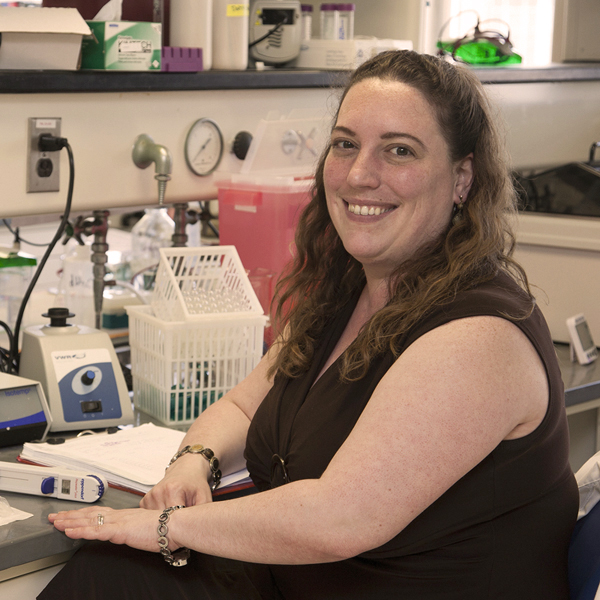Connell Lecture Series: Dr. Kristin Parent

Written by Annoj Thavalingam
On October 24th 2018, our Connell lecturer Dr. Kristin Parent arrived from Michigan State University to present her research on a novel mechanism of phage capsid stabilization. Transcripts decided to continue the conversation by meeting Kristin via Skype and discussing her research and work life in greater detail.
AT: What is your favourite part of your job as a PI and lecturer?
KP: The students!
AT: Teaching undergraduates or mentoring graduate students?
KP: In the lab as a PI, I get to train students “hands on” and watch them mature over time. I have a combination of undergraduates, graduates and postdocs. They all require tailored training and it’s awesome to watch them develop. In the classroom, it is less personal, but sometimes the whole class reacts to something and I know they all learned something important. Plus a few come to my help sessions every week and I can see them improve too.
AT: How or when did you first become interested in phages and phage infection?
KP: When I was a graduate student I joined the lab of Carolyn Teschke. I first started working on protein folding and my project was very difficult. After a year and a half we realized it was technically impossible, so I got a new project on the phage P22. I was so excited! It’s been that way ever since.
AT: Would you be able to tell me about the most exciting project you took on during your graduate studies or as a post-doc? I would imagine choosing any one to be difficult.
KP: Well, the first time I saw phages in the electron microscope was a very profound experience. They are just so cool looking and getting to see something smaller than a bacterium with such detail blew my mind. I was hooked.
AT: Was this around the time when you started working on p22 phages?
KP: Yes, I was in my 4th year of graduate school and working on in vitro assembly. You can mix phage proteins in the test tube and they spontaneously assemble. We would check the quality of the products by negative staining.
AT: Very nice! Which families of phages have you imaged by EM since that first encounter?
KP: I am focused on dsDNA phages, so we have imaged all sorts of morphologies. Myoviridae are very common, siphophages are also common. Podoviridae is the least common; so far we have only found two of those from the environment.
AT: Thank you Kristin. I’d like to talk a little about MSU now. What would you say is the coolest or quirkiest aspect of the campus?
KP: Well for a silly-ish answer, we have a fantastic dairy store with homemade ice cream from cows that live on the campus farms. SOOO GOOD! We always have a lab trip there to celebrate when good things happen, like papers published. The campus is also building a facility for rare isotopes (FRIB) and we have a cyclotron, which makes us very strong in physics. And now we are building a cryo-EM facility! (I’m biased, but this is by far the coolest)–funny pun intended.
AT: I have a final question for you Kristin. It’s a Harry Potter question though, does that work for you?
KP: Sure thing!
AT: Alrighty! If you were entering Hogwarts as a first-year and the Sorting Hat were placed on your head, which House would it select for you, and why?
KP: Not Slytherin! I would be happy to be in Gryffindor (science takes courage and nerve sometimes) and/or Ravenclaw (science also takes smarts and creativity). But the Gryffindor colors are better in my opinion. Plus you gotta love Mcgonagall!
AT: Yes, she’s fantastic! As a parting message, if you could tell students why phage research is exciting and worth pursuing in a sentence (or two), what would you tell them?
KP: They are the most abundant biological entities on Earth and even though they are tiny with relatively small genomes, we know only a teensy fraction about them. New discoveries are made every day and phages are intermingled with so many important areas of ecology and evolution. Not to mention that they gave rise to a huge amount of molecular biology tools. Who knows what else is out there?
AT: That’s wonderful, and you’re absolutely right! You’ve convinced me for one. Thank you so much for your time and input Kristin! It’s been a great chat, and it was nice to catch up after all these weeks. If you were here in person, I’d have a gift card for you, but alas…
KP: No worries about the card, take your lab out for coffee.
AT: That I will do, sponsored by you.
If you’d like to learn more about the Parent lab, you can find them on their lab page below.
https://kparentlab.natsci.msu.edu/
Also, don’t forget to follow their fabulous tweets @Phage4Lyfe
